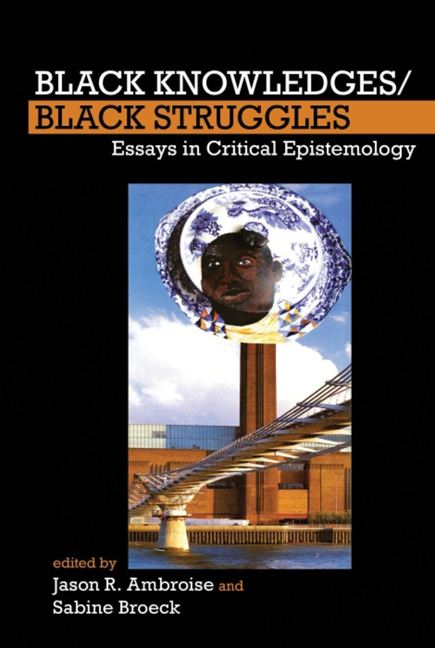Book contents
- Frontmatter
- Contents
- List of Figures
- List of Contributors
- 1 Black Knowledges/Black Struggles: An Introduction
- 2 “Come on Kid, Let's Go Get the Thing”: The Sociogenic Principle and the Being of Being Black/Human
- 3 Respectability and Representation: Black Freemasonry, Race, and Early Free Black Leadership
- 4 Ethno-Class Man and the Inscription of “the Criminal”: On the Formation of Criminology in the USA
- 5 Dehumanization, the Symbolic Gaze, and the Production of Biomedical Knowledge
- 6 Performing Scientificity: Race, Science, and Politics in the USA and Germany after the Second World War
- 7 Imaginary Black Topographies: What are Monuments For?
- 8 The Ceremony Found: Towards the Autopoetic Turn/Overturn, its Autonomy of Human Agency and Extraterritoriality of (Self-)Cognition
- Works Cited
- Index
4 - Ethno-Class Man and the Inscription of “the Criminal”: On the Formation of Criminology in the USA
- Frontmatter
- Contents
- List of Figures
- List of Contributors
- 1 Black Knowledges/Black Struggles: An Introduction
- 2 “Come on Kid, Let's Go Get the Thing”: The Sociogenic Principle and the Being of Being Black/Human
- 3 Respectability and Representation: Black Freemasonry, Race, and Early Free Black Leadership
- 4 Ethno-Class Man and the Inscription of “the Criminal”: On the Formation of Criminology in the USA
- 5 Dehumanization, the Symbolic Gaze, and the Production of Biomedical Knowledge
- 6 Performing Scientificity: Race, Science, and Politics in the USA and Germany after the Second World War
- 7 Imaginary Black Topographies: What are Monuments For?
- 8 The Ceremony Found: Towards the Autopoetic Turn/Overturn, its Autonomy of Human Agency and Extraterritoriality of (Self-)Cognition
- Works Cited
- Index
Summary
Who is this devastator, this modern “scourge of God,” whose deeds are not recorded in history? The criminal! […] He breeds criminals; the taint is in the blood, and there is no royal touch which can expel it.
Robert Fletcher, The New School of Criminal Anthropology (1891): 3–4Just as the Borana are imprisoned in the structural models of their society, a detached complicity also binds the Western historian to his society […] These men, be they literate or nonliterate, should not be seen merely as empirical historians. They are also grammarians of society, men who are well versed in the technique of ordering a select body of historical facts within a framework that is completely consistent with the system of values, the Weltanschauung and, above all, the cognitive model of their society. It allays their fears, confirms their prejudices, nurtures their hopes, and serves as the guide of action for their leaders. Thus, when history becomes a component of culture it has a direct impact on collective behavior.
Asmarom Legesse, Gada: Three Approaches to theStudy of African Society (1973): 269–270The sacred is a certain relationship with the origin of things in which imaginary replicas step in and take the place of real humans […] What disappears is man as co-author, along with nature, of himself, man as author of his social way of existing, of his social being. For humans are so constituted that they not only live in society […] but that they produce society in order to live. […]
It is as if human society could not exist unless it obliterated from the conscious mind the active presence of man at his own origin […] It is as if the survival of societies, or at least their survival as legitimate societies, as realities which all their members have an obligation to preserve and reproduce, were threatened by recognizing, by taking as the point of departure for a reflection about society, the essential fact that humans […] are in part their own authors.
Maurice Godelier, The Enigma of the Gift (1999): 172The Negro is not anti-social. He is no natural criminal.
W. E. B. Du Bois, Black Reconstruction in America, 1860–1880 (1935): 698- Type
- Chapter
- Information
- Black Knowledges/Black StrugglesEssays in Critical Epistemology, pp. 68 - 111Publisher: Liverpool University PressPrint publication year: 2015



